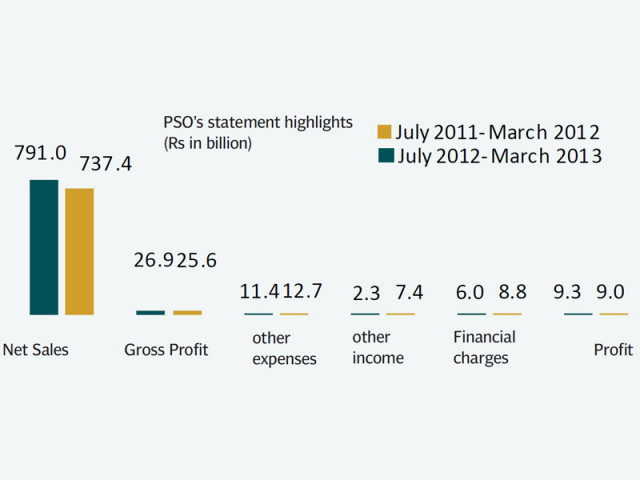Corporate results: PSO posts modest growth in earnings
Despite higher operational profitability, a large drop in company’s interest receivables restricts overall growth.

The company witnessed a 19% rise in its profit from operations over the previous year, however 69% lower other income restricted overall growth in profitability to a more humble 3.82%.
Pakistan State Oil (PSO), the nation’s only trillion-rupee company, announced its earnings results for the first nine months of fiscal 2013 on Tuesday. The company has booked profits worth Rs9.32 billion for the period from July 2012 to March 2013, higher by 3.82% if compared to Rs8.97 billion recorded for the same period of the preceding year. The profits translate into Rs37.72 earned for every share of the company.
During the period, the company’s gross margins increased ever so slightly by 3.4%, while gross profit rose 5% to Rs26.86 billion as against Rs25.60 billion last year due to higher margins in absolute terms, says an analyst note issued by Topline Securities. Considering provisional figures, the company’s sales volumes have declined nearly 1% from last year, the note adds.
The company witnessed a 19% rise in its profit from operations over the previous year, however 69% lower other income (reaching only Rs2.26 billion) restricted overall growth in profitability to a more humble 3.82%.
Topline Securities speculates that the absence of any penal income booked in the period has led to the drop in the other income head of the financial statement. However, the same reasons underlying that factor may also be behind the 32% drop in financial charges for the period, it says.
In money lending, penal interest is the punitive interest charged by a lender to a borrower if instalments are not paid according to the terms under which a loan was extended. Penal income is an important consideration in PSO’s case, as it is heavily mired in circular debt involving the country’s troubled power sector.
According to analysts, PSO books penal income as and when it is received. Therefore, the lower interest booked may be indicative of the fact that it has received even lesser payments from debtors in the period, or, alternatively, that the circular debt issue has eased somewhat over the previous year.
The drop in financial charges indicates that PSO now owes less to its suppliers, thereby incurring lower penalties on late payments. That, coupled with the PSO MD’s recent statements which indicate that the size of the circular debt may actually be diminishing, may give more substance to the speculating that the crisis may be easing somewhat.
“When I joined PSO, its receivables were hovering around Rs250 billion. They have now come down to Rs110 billion because of our pain-staking efforts over the past months,” PSO MD and Chief Executive Naeem Yahya Mir told The Express Tribune recently. The PSO MD believes that cost-cutting measures he took over the year will save PSO at least Rs8-9 billion annually.
Published in The Express Tribune, April 24th, 2013.
Like Business on Facebook to stay informed and join in the conversation.



















COMMENTS
Comments are moderated and generally will be posted if they are on-topic and not abusive.
For more information, please see our Comments FAQ